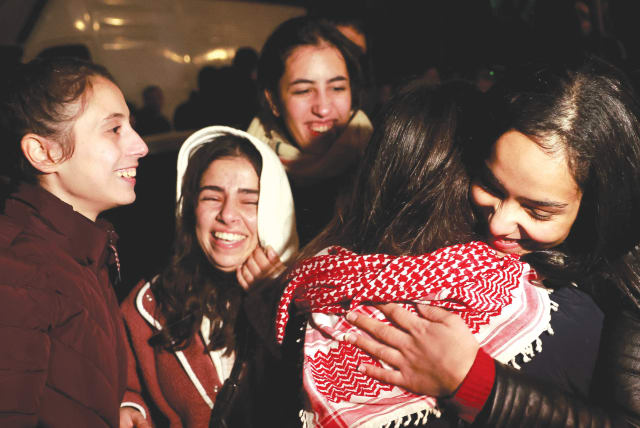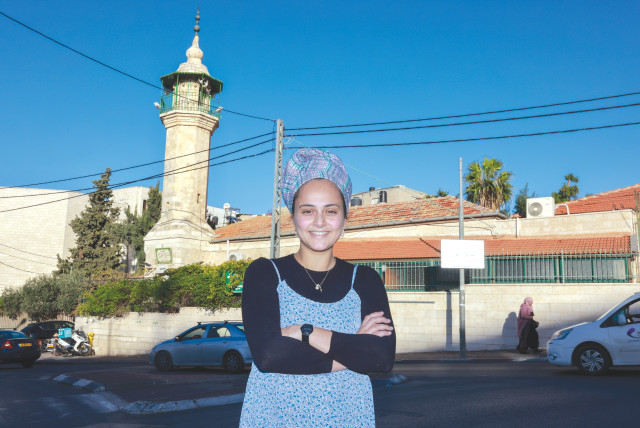Jerusalem residents worry over Palestinian prisoners freed in Hamas deal

JERUSALEM AFFAIRS: Many Palestinian prisoners were released to their homes in the Jerusalem area, sometimes right back into the neighborhoods where they committed their crimes.
As Israelis rejoice in the release of some of the Hamas-held hostages from Gaza, a parallel difficulty is being created as Israel releases Palestinian prisoners who have been convicted – or accused of – terrorist activities.
In the first four days of the temporary Israel-Hamas ceasefire, which began last Friday, Israel released 150 Palestinian prisoners, 117 who – despite their terrorist activities – are under the age of 18, plus 33 women. Many of them were released to their homes in the Jerusalem area, sometimes right back into the neighborhoods where they committed their crimes, causing much concern among Jerusalemites.
In December 2021, Moriah Cohen, 28, was wounded when a then-14-year-old female terrorist stabbed her in the back as she was walking her five children to daycare in the east Jerusalem neighborhood where both assailant and victim live. The attacker, Nafoz Hamad, was among the Palestinian prisoners released this week. On Tuesday, police had to put a stop to a party in honor of Hamad. On Wednesday, an interim injunction was issued requiring her to have no contact with the Cohen family, who live across the street in the capital’s Shimon Hatzadik neighborhood.
Fear is Cohen’s foremost reaction to the return of her criminal neighbor.
“It’s not fun to walk in the street near my house, knowing that the woman who stabbed me in front of my children is back home, perhaps peeking at me from her house. But I also feel great anger. How can that be a legal procedure? She got 12 years just two weeks ago, and here she is again. I didn’t believe it would happen, I couldn’t believe it. I saw the police here, that’s how I realized she did come back. I closed the curtains, still finding it hard to believe this was happening.”
The exterior of the Hamed home, literally facing Cohen’s, boldly displays a large banner featuring the Al Aqsa Mosque and the Ka’aba in Mecca – an unmistakable message to her Jewish neighbors.
Today, although Hamad is still only 16 years old, Cohen refuses to consider her as a youth who was just brainwashed and didn’t realize what she was doing.
“She never expressed any regrets, I believe she knew exactly what she was doing. She is a[n attempted] murderer, and I am convinced that she will continue to [attempt to] murder whenever she can,” said Cohen, two of whose children witnessed the stabbing. Her husband is a reservist presently serving in Gaza.
Palestinian prisoners released back into Jerusalem – and no one asked the municipality
THE PALESTINIAN security prisoners were first transferred to Ofer prison where they signed a document undertaking not to engage in further terrorism and were then released. The Israel Security Agency (Shin Bet) Commissioner said that the agency was “Ready to respond to incidents of incitement and disorder.”
The prisoners who were transferred to Judea and Samaria were handed over to the Palestinian Authority at the Beitunia crossing; while those who are eastern Jerusalem residents were first transferred to a detention cell in the capital’s Russian compound and from there released to their homes.
Senior officials in the Jerusalem Municipality claim that no one in the government nor in the security forces checked with them in advance to ascertain whether the city could handle this influx of criminals who could disturb the relative peace in the capital. Despite the prevailing opinion that the residents of the eastern city are not interested in an escalation of the security situation, this part of the hostage release agreement is not popular.
Security forces have been ensuring that there are no victory celebrations or mass receptions for those let out of prison, with the sunsequent two days unfolding peacefully despite the bitter pill. However, this atmosphere did not last long.
The illusion was shattered on Thursday morning when two residents of the Tzur Bahar neighborhood, heavily armed with guns and ammunition, murdered three and injured 10 at the entrance to the city. The two terrorists, who were neutralized, are members of the same family and were released from prison a few years ago.
JERUSALEM MAYOR Moshe Lion said, “I am in daily contact with the police and we verify every issue and every aspect with them.”
“It’s not easy,” he added, “but the security forces are attentive to the city’s needs. We all agree on one thing: The majority of the 350,000 Arab residents of the east city are not interested in these terrorist acts and certainly do not join in – and we all have to live here together. But we know that one or two are enough to cause destruction. And that is what happened this morning [Thursday].”
Lion believes that we must live together with the Arabs in the city, but he also understands that without a clear system for the protection of people of Jerusalem, it is only a matter of time before what happened on Thursday is repeated. The terrorists from Zur Bahar were not the usual youth from eastern Jerusalem who go out with knives or scissors looking for Jews to stab.
Additionally, the Jerusalem Municipality quickly realized that the released minors are registered students in the municipal education system and, by law, must return to class. Municipal officials are currently deciding how to abide by the law without allowing their renewed presence in schools to encourage support for terrorism among the students in the east of the city. Education Minister Yoav Kish and his staff expressed strong opposition to the return of terrorist minors to the municipal education system. At a special meeting that took place on Wednesday at the ministry, several options were put forward to solve the problem – one of them was the establishment of a separate educational framework.
Meanwhile, the old city is empty. Most of the shops in the Arab shuk (market) are closed.
“There are no bar-mitzvahs at the Western Wall, no tourists, and no pilgrims,” said Ami Meitav, a tour guide specializing in the Old City.
“The Temple Mount is deserted, and very few Muslims come to Al Aqsa to pray – no one prevents them from coming, of course; but the feeling among them is that these days it might be better to stay away from Israeli security forces.
“But there is another, more significant reason. They understand that these days, the Israelis are a wounded people and that this is not the time. Many who used to come to pray at Al Aqsa, find it better to remain in their own neighborhoods and go to the local mosques. Some would say that it is better to pray in the mosque in Wadi Joz for example, and not run into Jews on the way to Al Aqsa.
“There is fear. During the first two weeks, a large number of Arab employees, including at the Jerusalem Municipality, didn’t show up at work. Today, I can say that those who have steady work – municipality, supermarkets, even in the medical professions – came back, but there are many who prefer to wait a little longer, and avoid any encounter with Jews in the city,” added Meitav. •
Jerusalem Post Store
`; document.getElementById("linkPremium").innerHTML = cont; var divWithLink = document.getElementById("premium-link"); if (divWithLink !== null && divWithLink !== 'undefined') { divWithLink.style.border = "solid 1px #cb0f3e"; divWithLink.style.textAlign = "center"; divWithLink.style.marginBottom = "15px"; divWithLink.style.marginTop = "15px"; divWithLink.style.width = "100%"; divWithLink.style.backgroundColor = "#122952"; divWithLink.style.color = "#ffffff"; divWithLink.style.lineHeight = "1.5"; } } (function (v, i) { });

